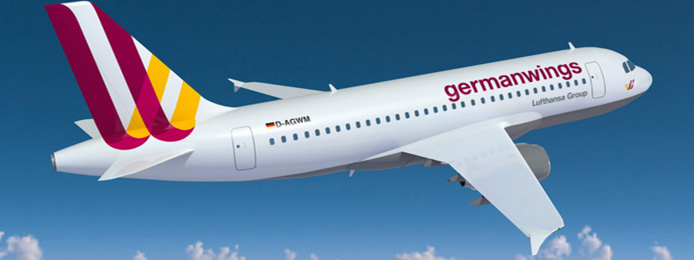I try to stay away from extremely technical terminology in these blogs because I want them to be easily & quickly read. I still have that in mind with today’s content but admittedly, this is more technical in nature. It comes from the file …”Things that make you go … hmmm!”
 When there is a major property or vehicle incident, there is ALWAYS insurance involved. There is almost always liability lawsuits from those who were harmed and various other avenues that insurance covers when something occurs on whatever scale of the incident. The Germanwings aircraft crash last week has some serious insurance implications and they are somewhat complicated.
When there is a major property or vehicle incident, there is ALWAYS insurance involved. There is almost always liability lawsuits from those who were harmed and various other avenues that insurance covers when something occurs on whatever scale of the incident. The Germanwings aircraft crash last week has some serious insurance implications and they are somewhat complicated.
 When there is a major property or vehicle incident, there is ALWAYS insurance involved. There is almost always liability lawsuits from those who were harmed and various other avenues that insurance covers when something occurs on whatever scale of the incident. The Germanwings aircraft crash last week has some serious insurance implications and they are somewhat complicated.
When there is a major property or vehicle incident, there is ALWAYS insurance involved. There is almost always liability lawsuits from those who were harmed and various other avenues that insurance covers when something occurs on whatever scale of the incident. The Germanwings aircraft crash last week has some serious insurance implications and they are somewhat complicated. So just how does insurance step in for this type of event? This March 30th release from Neilson Marketing – a company that markets information to the insurance underwriting community – gives a peak into how settlements in this loss could be handled.
The unusual circumstances surrounding the Germanwings crash won’t necessarily free the airline and its insurers from claims of negligence, aviation lawyers said.
Deutsche Lufthansa AG, Germanwings’ parent company, and its insurer will likely still face large legal liability claims in the crash of Flight 9525 despite indications that the co-pilot, who is suspected of deliberately crashing the plane, hid medical problems from his employer.
“The airline has unlimited liability unless it can prove it is free from fault,” said Steven Marks, a partner at aviation litigation firm Podhurst Orseck. The crash of the Airbus A320 on Tuesday (March 24) killed all 150 people on board.
Flight 9525 co-pilot Andreas Lubitz was suffering from depression and had been excused from work by a neuropsychologist for a period including the day of the crash, according to a person familiar with the investigation. He ignored the advice and reported to work without informing the airline of the doctor’s note. Investigators were working to establish whether Mr. Lubitz intended to commit suicide.
Even so, the carrier could struggle to demonstrate it wasn’t partly at fault. “Apart from inadequate psychological monitoring, the carrier could have enacted the two-person cockpit rule that might have prevented the accident,” Mr. Marks said.
The pilot of Flight 9525 had left the cockpit temporarily and appears to have been locked out by Mr. Lubitz as he set the plane on its descent that ended in its crash in the French Alps. European rules don’t require that two crew members be in the cockpit at all times, though many carriers including Lufthansa last week moved to such procedures in the wake of the crash.
Lufthansa could be liable for more than the approximately $150,000 the families of victims are automatically entitled to receive under international rules governing commercial flying, said Kevin Durkin, a personal-injury lawyer specializing in aviation for Clifford Law Offices. Families’ rights to make further claims aren’t waived by accepting those payments.
Lufthansa on Friday said it would pay an initial sum of 50,000 (about $54,000) per person to the relatives of Flight 9525 passengers. The payments wouldn’t affect potential further claims made by the families, the airline said.
In the aftermath of some crashes, next of kin have been able to win multimillion-dollar awards, Mr. Durkin said. After a crash, airlines tend to settle quickly to avoid further damage to their reputation from a prolonged legal battle, he said.
Lufthansa, which has struggled to meet financial targets amid labor unrest and restructuring measures, wouldn’t pay the legal costs itself. The financial liability rests with its insurer, a unit of Germany’s Allianz, which typically is reinsured. The airline later could face higher insurance premiums though those would remain a small part of a carrier’s costs compared with fuel and staff, an airline-insurance specialist said.
Allianz on Friday said it retains the liability element of the policy regardless of the co-pilot’s actions. The company said it wouldn’t disclose detailed claims estimates it considers confidential nor the extent to which it is reinsured.
It was reported in the news just this morning that Lufthansa’s insurers are setting aside $300 million to deal with possible costs resulting from the crash. Lufthansa spokeswoman Kerstin Lau confirmed a report on the set-aside. She said $300 million is the amount currently reserved to deal with “all costs arising in connection with the case.”
As you can see, there’s an insurance back-story to almost everything. The long term after-effect of this will be that airline insurance premiums will continue to rise more and more each year as insurance companies make an effort to recoup some of their losses. As surely as that happens, airline ticket prices will follow along close behind and guess who shares in that burden? You’re right – you and I! So the adage – what goes around, comes around is never more true than in insurance.
One thing we don’t insure are airplanes or airlines. So you’re safe in knowing our carriers won’t be affected by these losses. We’re here to insure what you need! Contact us at info@BentonWhite.net or reach out to any of our staff at 615.377.1212. We’re here to help and always ready to earn your business!





